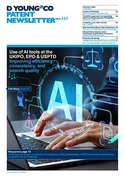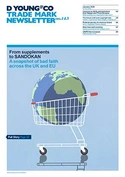Boston Scientific v DPMA: SPCs & medical devices
Can a supplementary protection certificate (SPC) be granted for a substance which was an integral and active part of a medical device? In Boston Scientific v Deutsches Patent-und Markenamt (German Patent and Trade Mark Office - DPMA), the Court of Justice of the European Union (CJEU) has provided some guidance.
Here, Boston Scientific was the owner of European patent (DE) 0,681,475. The patent related to the use of medicinal substances designed to reduce restenosis following angioplasty. In particular, it disclosed that paclitaxel, the principal active ingredient known for treating certain cancers and marketed under the name of Taxol, inhibited or reduced the proliferation and migration of cells in the blood vessel wall and thus counteracted the risk of restenosis. Claim 8 of that patent was worded as follows: “Use of taxol [paclitaxel] for the preparation of a medicament to maintain an expanded vessel luminal area”.
Boston Scientific produced a paclitaxel-coated stent under the brand name Taxus. For the European Union it obtained a (mandatory) CE certificate of conformity for that device. As part of that process, pursuant to section 7.4 of Annex I to Directive 93/42 (the Medical Devices Directive) the paclitaxel component of the drug was the subject of a prior assessment.
In 2011, Boston Scientific filed an SPC application with the German Patent and Trade Mark Office (DPMA) on the basis of its patent and the CE certificate of conformity for the device. It reasoned that the CE certificate of conformity administrative procedure involved an in-depth review of the safety and usefulness of paclitaxel in conjunction with its Taxus medical device which was equivalent to the marketing authorisation procedure for medicines laid down in Directive 2001/83 (the Medicinal Products Directive).
This argument was rejected by the DPMA. Boston Scientific appealed to the German Federal Patents Court which, identifying differences in the application of Article 2 of the EU medicines SPC Regulation (469/2009) (the SPC Regulation) by different member states, referred the issue to the CJEU.
Article 2 of the SPC Regulation provides that any medicinal product protected by a patent in the territory of a member state and subject, prior to being placed on the market as a medicinal product, to an administrative authorisation procedure as laid down in the Medicinal Products Directive (not the Medical Devices Directive) may be the subject of an SPC.
The CJEU held that Boston Scientific could not rely on the procedure to obtain its certificate of conformity in order to satisfy the requirements of Article 2 of the SPC Regulation. It reasoned as follows:
- The SPC Regulation was expressly limited to medicinal products. Medicinal products and medical devices were mutually exclusive, with different modes of action. A product which achieved its principal mode of action by pharmacological, immunological or metabolic means fell under the definition of a medicinal product; everything else was a medical device. If a medical device had a substance ancillary to it (which, if used separately, would have been a medicinal product), it did not affect its classification as a medical device.
- The SPC Regulation was expressly limited to medicinal products subject to a marketing authorisation. The prior assessment in section 7.4 of Annex I of the Medical Devices Directive was in relation to a use of the substance dependent of the device taking into account the intended purpose of the medical device. It may, therefore, have been similar to a marketing authorisation, but it was not a marketing authorisation per se.
- The case law relied on by Boston Scientific, namely Hogan Lovells International (C‑229/09), and Sumitomo Chemical(C‑210/12) was not applicable as these related to SPCs for plant protection products, and concerned products which had been granted, as plant protection products, either provisional or emergency marketing authorisations.
The decision does much to close the door on the prospect of obtaining SPCs for products subject to procedures equivalent to marketing authorisations.
Read full decision
Judgment of the Court (Ninth Chamber) of 25 October 2018. Proceedings brought by Boston Scientific Ltd. Request for a preliminary ruling from the Bundespatentgericht. Case C-527/17.
Full decision (EUR-Lex)
